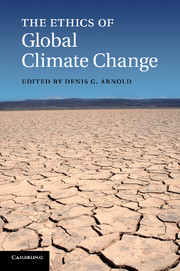Book contents
- Frontmatter
- Contents
- List of illustrations
- List of contributors
- Acknowledgements
- Introduction: climate change and ethics
- 1 Energy, ethics, and the transformation of nature
- 2 Is no one responsible for global environmental tragedy? Climate change as a challenge to our ethical concepts
- 3 Greenhouse gas emission and the domination of posterity
- 4 Climate change, energy rights, and equality
- 5 Common atmospheric ownership and equal emissions entitlements
- 6 A Lockean defense of grandfathering emission rights
- 7 Parenting the planet
- 8 Living ethically in a greenhouse
- 9 Beyond business as usual: alternative wedges to avoid catastrophic climate change and create sustainable societies
- 10 Addressing competitiveness in US climate policy
- 11 Reconciling justice and efficiency: integrating environmental justice into domestic cap-and-trade programs for controlling greenhouse gases
- 12 Ethical dimensions of adapting to climate change-imposed risks
- 13 Does nature matter? The place of the nonhuman in the ethics of climate change
- 14 Human rights, climate change, and the trillionth ton
- Select bibliography
- Index
- References
6 - A Lockean defense of grandfathering emission rights
Published online by Cambridge University Press: 11 April 2011
- Frontmatter
- Contents
- List of illustrations
- List of contributors
- Acknowledgements
- Introduction: climate change and ethics
- 1 Energy, ethics, and the transformation of nature
- 2 Is no one responsible for global environmental tragedy? Climate change as a challenge to our ethical concepts
- 3 Greenhouse gas emission and the domination of posterity
- 4 Climate change, energy rights, and equality
- 5 Common atmospheric ownership and equal emissions entitlements
- 6 A Lockean defense of grandfathering emission rights
- 7 Parenting the planet
- 8 Living ethically in a greenhouse
- 9 Beyond business as usual: alternative wedges to avoid catastrophic climate change and create sustainable societies
- 10 Addressing competitiveness in US climate policy
- 11 Reconciling justice and efficiency: integrating environmental justice into domestic cap-and-trade programs for controlling greenhouse gases
- 12 Ethical dimensions of adapting to climate change-imposed risks
- 13 Does nature matter? The place of the nonhuman in the ethics of climate change
- 14 Human rights, climate change, and the trillionth ton
- Select bibliography
- Index
- References
Summary
A core issue in the debate over what constitutes a fair response to climate change is the appropriate allocation of emission rights between the developed and the developing world. Various parties have defended equal emission rights per capita on grounds of equity. The atmosphere belongs to us all and everyone should be allocated an equal share. Others have defended higher emission rights per capita for developing countries on grounds of historical accountability. Developed countries are largely responsible for the threat of climate change due to their past emissions and, since they currently continue to enjoy the benefits thereof, they should be willing to accept lower emission targets.
However, in reality we see that developed countries currently have much higher emission rates per capita and will continue to have higher rates than developing countries for some time to come. There is talk of “grandfathering” – setting emission targets for developed countries in line with their present or past emission levels. What, if anything, can be said in defense of grandfathering?
In Chapter 4 of this book Caney discusses grandfathering and puts the matter very bluntly: “No moral and political philosopher (to my knowledge) defends grandfathering, presumably assuming that it is unjust.” Grandfathering can at best be defended by means of pragmatic arguments. In Realpolitik we need to make some concessions in order to get all the parties on board. But this is like making concessions in negotiations with the Mafia.
- Type
- Chapter
- Information
- The Ethics of Global Climate Change , pp. 124 - 144Publisher: Cambridge University PressPrint publication year: 2011
References
- 20
- Cited by



